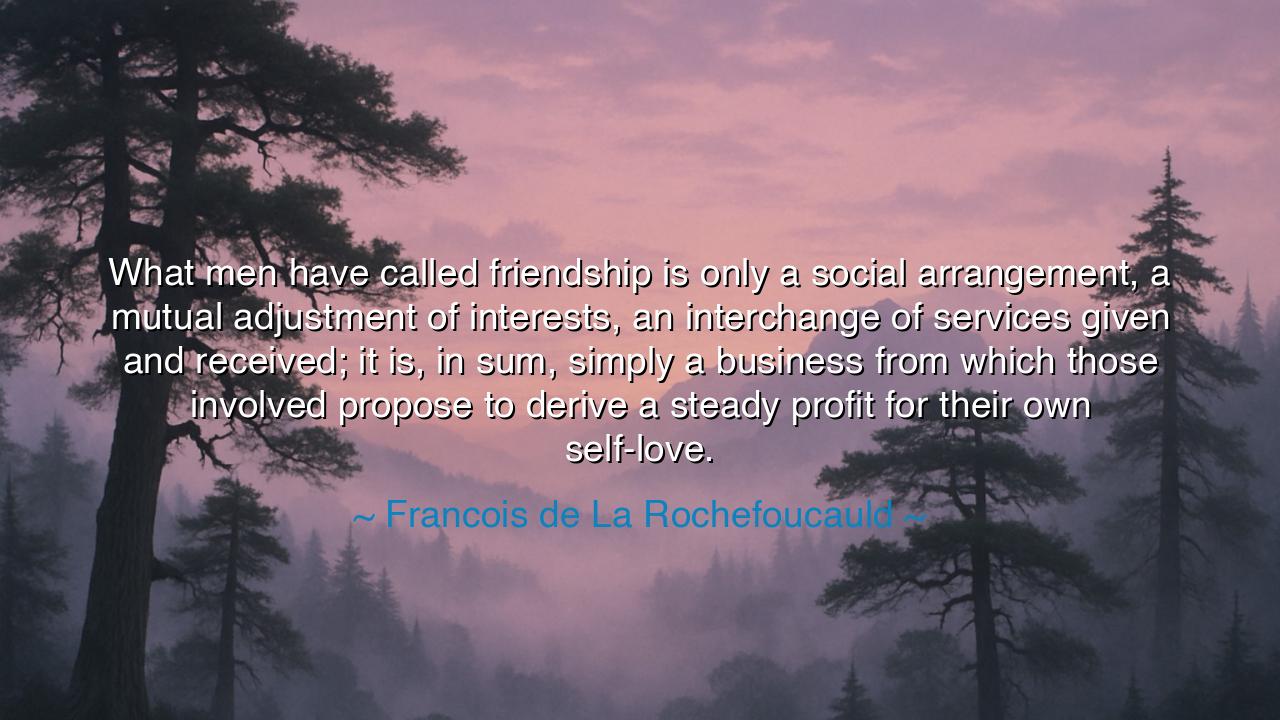
What men have called friendship is only a social arrangement, a
What men have called friendship is only a social arrangement, a mutual adjustment of interests, an interchange of services given and received; it is, in sum, simply a business from which those involved propose to derive a steady profit for their own self-love.






"What men have called friendship is only a social arrangement, a mutual adjustment of interests, an interchange of services given and received; it is, in sum, simply a business from which those involved propose to derive a steady profit for their own self-love." These cutting words from Francois de La Rochefoucauld hold up a mirror to the nature of friendship as it is often understood in the world—a bond not so much of genuine affection and mutual growth, but of self-interest and calculation. La Rochefoucauld, a master of human psychology, unveils the uncomfortable truth that what many have called friendship may often be little more than an exchange of favors, a series of transactions designed to satisfy one's own desires and needs. Friendship, in this view, becomes a business arrangement, one that serves the ego rather than the spirit, offering a steady profit in the form of personal gain.
In the ancient world, the notion of friendship was viewed not as a mere contract or a convenience, but as a deep bond of virtue and loyalty. The philosophers of Greece, such as Aristotle, spoke of friendship as one of the highest forms of human relationship. For Aristotle, true friendship was based on a shared pursuit of goodness, a bond forged not through the exchange of favors but through mutual respect and a shared commitment to living a virtuous life. Aristotle distinguished between friendships based on utility, pleasure, and virtue. The most enduring and meaningful friendships, he argued, were those founded on virtue—a connection that transcended personal gain and sought the betterment of both individuals involved. This stands in stark contrast to La Rochefoucauld’s view, which suggests that much of what men call friendship is rooted not in virtue, but in the pursuit of self-love.
Consider the example of David and Jonathan, whose friendship is celebrated in the Bible. Their bond was not based on convenience, nor on the exchange of services or material gain. Instead, it was a friendship founded on deep loyalty and mutual respect—an unwavering support in times of adversity. Jonathan, despite being the son of King Saul, who sought to kill David, chose to stand by him, risking his own life for his friend’s safety. This friendship was not based on self-interest but on a shared understanding of honor and sacrifice. In this way, their bond transcended the worldly concerns of power and position, standing as an example of a friendship built on something far greater than personal gain.
In contrast, the example of Julius Caesar and his relationship with Pompey offers a different kind of friendship. Their alliance, formed during the rise of the First Triumvirate, was initially based on a mutual exchange of political power. Their friendship, though seemingly strong at first, was one of convenience—an arrangement built on the desire for mutual advantage. However, as Caesar’s power grew and his ambitions expanded, their friendship began to fracture, revealing the transactional nature of their bond. Pompey and Caesar eventually turned on each other, and their so-called friendship was shattered, leaving behind only the wreckage of political rivalry. In this example, their friendship mirrors the business arrangement La Rochefoucauld describes—an exchange of services for self-interest, rather than a bond founded on loyalty or shared virtue.
La Rochefoucauld’s view of friendship as a self-serving business arrangement carries a lesson for us all. It forces us to examine the relationships we build and ask whether they are founded on genuine care and respect, or whether they are merely convenient exchanges. Are we truly friends with those we surround ourselves with, or do we simply maintain these relationships for what we can gain from them—be it social advantage, favors, or validation? This harsh reflection challenges us to scrutinize our own motivations in our relationships and to seek friendships that go beyond mere transactions.
The lesson from La Rochefoucauld’s words is one of honesty and self-awareness. True friendship, if it is to endure and enrich our lives, must be based on something far greater than mutual self-interest. We must seek friendships that are rooted in mutual respect, empathy, and a genuine desire to uplift one another. The transactional friendships that La Rochefoucauld describes may serve us in the short term, but they are ultimately empty, for they lack the depth and authenticity that make a friendship truly meaningful.
In our own lives, let us strive to build relationships that are not based on what we can gain, but on what we can give. Let us seek friends who inspire us to be better, who challenge us to live with greater integrity, and who stand with us through both the joys and sorrows of life. Friendship, when it is rooted in virtue and genuine connection, becomes a wellspring of growth, support, and shared wisdom, offering far greater riches than any transactional arrangement ever could. True friendship transcends the business of self-love and opens the door to a deeper, more enduring bond. It is this kind of friendship that will sustain us through life’s trials and celebrate with us in its triumphs.






AAdministratorAdministrator
Welcome, honored guests. Please leave a comment, we will respond soon